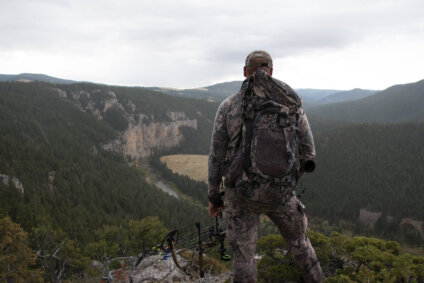Public Lands in Private Hands?
A movement to sell America's federal lands has made it's way to Montana
Speaking in Gardiner, Montana in 1903, President Theodore Roosevelt called national forests and public lands “essential democracy”, lands owned and managed not to enrich the few but “for the people as a whole.” From the vast public domain, President Roosevelt had the foresight to reserve for the American people 150 National Forests, 51 Fish and Wildlife Refuges, 18 National Monuments and five National Parks.
The quiet beauty, mountain grandeur and vast prairies of Montana are today protected because of Teddy’s vision. These lands were recognized and honored in the very first act of the Montana State Legislature as “lands belonging to the citizens of the United States.” Since then, our state government has always recognized federal lands as American lands that belong to all American citizens.
In contrast to private property, which is often posted with signs that read Keep Out, we are free to enter America’s public lands and to experience their beauty and wonders: to fish, hunt, float and camp under the stars with family and friends. This is our land. Roughly one-third of all lands in the United States are public lands, owned by the citizens of the United States, and nearly 30% of Montana is comprised of National Parks, National Forests, Wildlife Refuges and other federal lands.
Yet, even as Montanans celebrate the blessings of our public lands and crystal-clear waters, a national political campaign is moving to rob Americans of our public lands and outdoor heritage. Over the past two years, legislatures in Utah, Arizona, Wyoming, New Mexico, Colorado, Nevada, Idaho and Montana have passed or considered passing legislation “demanding” that Congress “transfer” national forests and American public lands to individual states for management or disposal as those states see fit.
The most disturbing aspect of this movement is that its marching orders to dispose of America’s public lands come from organizations with extreme political agendas like the American Lands Council, Americans for Prosperity, and the American Legislative Exchange Council (ALEC), which is funded by ExxonMobil and Koch Industries.
These radical organizations are the architects of the agenda to privatize our public lands, using scripted messages, high dollar media campaigns, and wealthy lobbyists to bankroll the campaign. And they have arrived in Montana with their eyes on some of our nation’s greatest outdoor treasures.
Last year, the Montana State Legislature passed Senate Joint Resolution 15 (SJ15), which called for a study on how to improve federal land management in Montana. The task of conducting the study fell to the Environmental Quality Council (EQC), an interim committee of the state legislature. The EQC began meeting in the summer of 2013 and has met nearly 30 times since then. However, in January of this year, the discussion took an alarming turn when Ken Ivory, a Utah State Representative and founder of the American Lands Council, traveled to Montana to speak to the EQC.
Ivory was the architect of Utah’s Transfer of Public Lands Act (HB148), which passed in 2012 and called for the transfer of federal lands to the state of Utah. In his testimony to the EQC in January, he urged Montana legislators to follow the example of the “Industry State” by demanding that American federal lands within Montana’s borders be handed over to the state.
Public land “transfer” proponents on the EQC took up Ivory’s call to action and continued populating the committee’s “study” with arguments to support the divestment of American lands. Then, in June, the Montana Republican Party reinforced the committee’s efforts by adopting a resolution at their annual convention to support the transfer of federal lands to the state.
Finally, in July, the EQC made headlines when a committee member from Miles City expressed concern about efforts to bias the study toward an anti-public lands agenda. Since then, public outcry against efforts to transfer and sell “lands belonging to the citizens of the United States” has been on the rise. Now, the EQC “study” is available for public comment and the Montana Wilderness Association (MWA) strongly encourages our members to make their voices heard loud and clear.
MWA was founded in 1958 to “hold in trust” our public lands within Montana. In recent years, we have gained a reputation for building new partnerships by collaborating with people from all walks of life and all political persuasions to better manage our national forests and public lands.
These new approaches have opened doors for cooperation, expanded our ability to protect Montana’s wilderness, and put us in a position to pass on the blessings and freedoms of Montana’s public lands to future generations. However, certain special interests and radical politicians are not interested in collaboration. Indeed, they’re not interested in public lands at all, and they’ve picked a fight over who will control our outdoor heritage in the future.
This is a fight we must win.
The EQC “study” has been posted for public comment and Montanans across the state are weighing in by emailing EQC staff person Joe Kolman at . You can read MWA’s comments here.
The deadline for public comment is this Saturday the 16th. Tell the Environmental Quality Council that . . .
- Our national forests and public lands are not for sale, transfer or disposal – not today, not as a last resort, not ever.
- No court has ever found permanent reservation of national parks, national forests, wildlife refuges and BLM lands for the “benefit and enjoyment of the people” to be illegal, as some private interests claim.
- Montanans continue to cherish the priceless blessings of our public lands, which were described by our first state legislature as “lands belonging to the citizens of the United States.”
Thank you for taking a few minutes to ensure that your opinion is part of the official public record.
Stay Connected
"(Required)" indicates required fields
